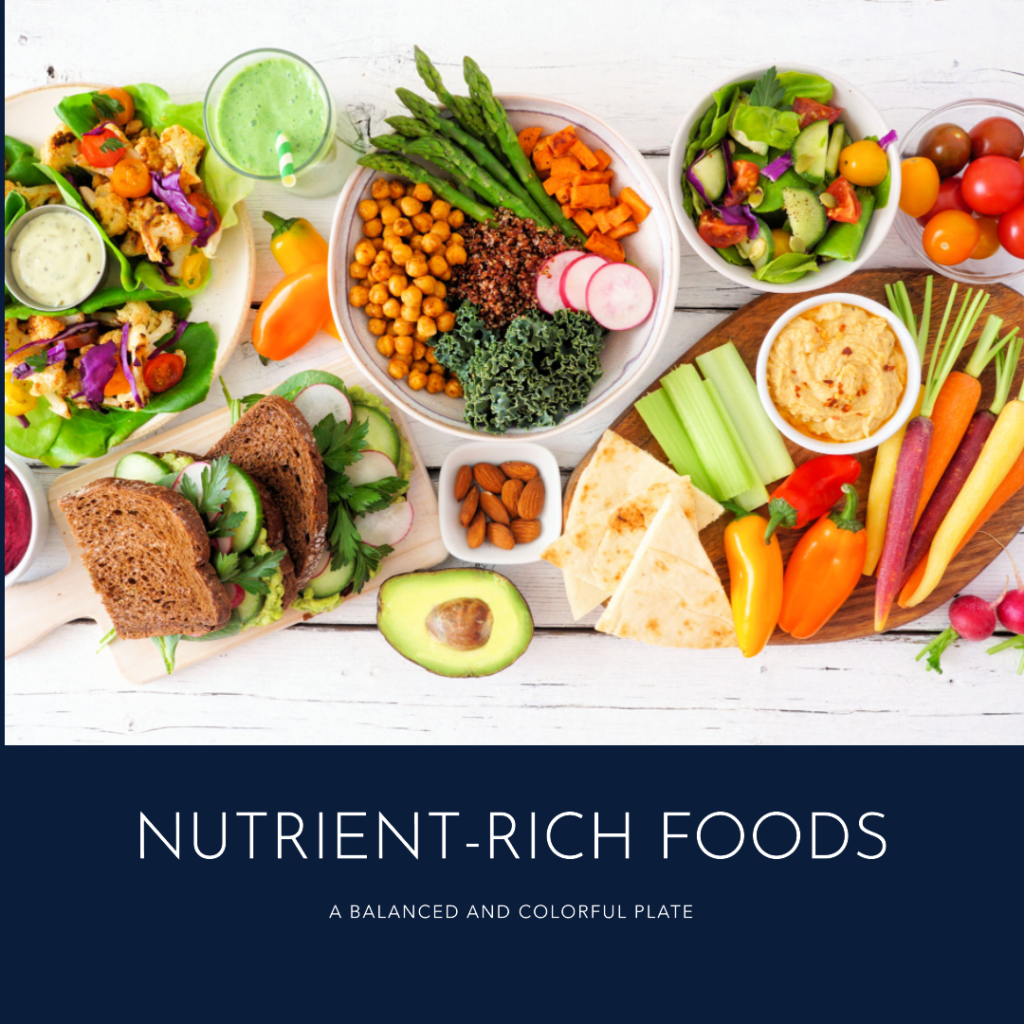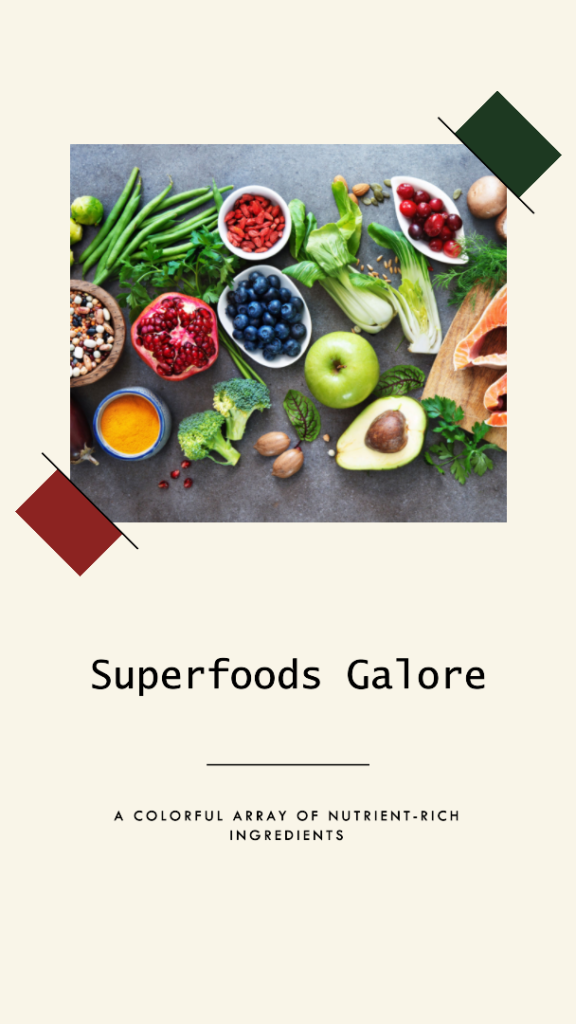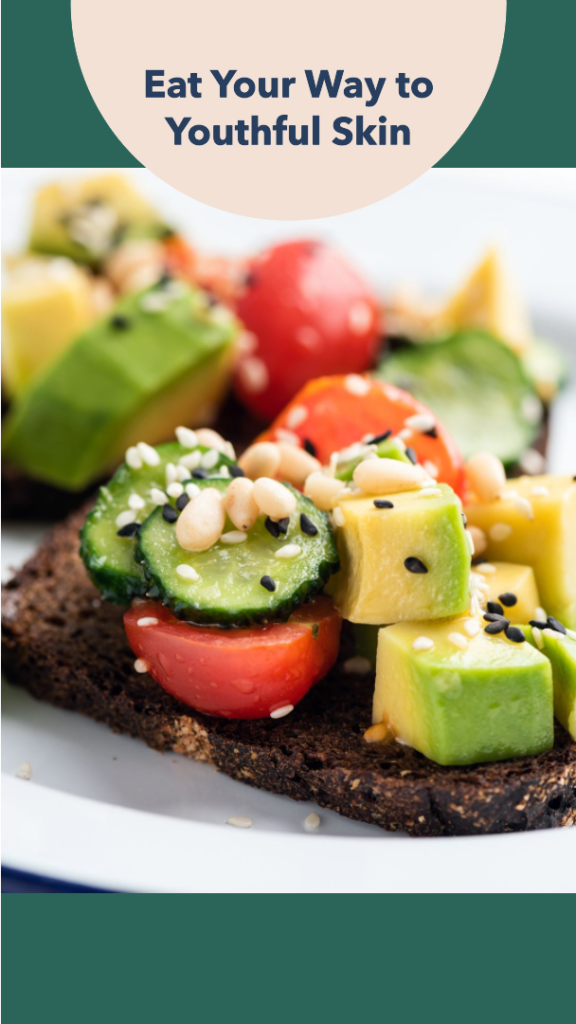In today’s fast-paced world, where age seems to be catching up with us faster than ever, it’s crucial to pay attention to our nutrition. As women, maintaining youthfulness becomes a priority, not only for our appearance but also for our overall well-being.
By nourishing our bodies with the right nutrients, we can embrace the journey of aging gracefully. Welcome to the ultimate guide that unveils the power of nutrition in preserving your youthfulness.

In this guide, we will explore the key aspects of nutrition that can help you maintain a youthful and vibrant life. From understanding the nutritional requirements for women to discovering the foods that support healthy aging, we will provide you with valuable insights and practical tips to optimize your well-being. Let’s embark on this transformative journey together.
Nutritional Requirements for Women
To unlock the secrets of maintaining youthfulness, let’s first explore the essential dietary requirements for women. Your body needs a delicate balance of macronutrients and micronutrients to function optimally.
Macronutrients, including proteins, carbohydrates, and fats, provide energy and support various bodily functions. Micronutrients, such as vitamins and minerals, are necessary for cellular processes and overall health.
Proteins play a crucial role in maintaining youthfulness. They are the building blocks of our body and are involved in collagen production, which promotes skin elasticity and strength.

Iron is another essential nutrient that supports oxygen transport and energy production, helping you stay vibrant and energetic. Additionally, other micronutrients like vitamins A, C, and E, along with antioxidants, contribute to healthy skin, hair, and nails.
To meet your nutritional requirements, focus on incorporating nutrient-dense foods into your diet. These include fruits, vegetables, lean proteins, whole grains, and healthy fats.
By prioritizing these foods, you provide your body with the necessary fuel and building blocks to look and feel your best as you age.
Understanding Macronutrients: The Building Blocks of Youthfulness
Macronutrients, which include carbohydrates, proteins, and fats, are the fundamental components of a balanced diet that play a crucial role in maintaining youthful vitality. Let’s delve into each macronutrient and explore their specific benefits for anti-aging and overall health.
- Carbohydrates: Carbohydrates are the primary source of energy for our bodies. They provide fuel for daily activities and support the proper functioning of organs and tissues. Complex carbohydrates, such as whole grains, fruits, and vegetables, are rich in fiber, vitamins, and minerals. They offer sustained energy release and help regulate blood sugar levels, preventing energy crashes and supporting a steady mood. Incorporating nutrient-dense carbohydrates into your diet can provide the necessary energy to maintain an active lifestyle and support overall well-being.
- Proteins: Proteins are the building blocks of life. They are essential for repairing and building tissues, including muscles, skin, and organs. As we age, maintaining muscle mass becomes increasingly important for a youthful and toned appearance. Adequate protein intake promotes muscle growth, repair, and maintenance. Include lean sources of protein such as poultry, fish, beans, legumes, and tofu in your meals. These protein-rich foods also contain amino acids, which are vital for collagen production—a key component in maintaining firm and supple skin.
- Fats: Healthy fats are essential for numerous bodily functions and are particularly beneficial for maintaining youthful skin and supporting brain health. Omega-3 fatty acids, found in fatty fish like salmon and walnuts, help reduce inflammation, enhance cognitive function, and promote healthy skin elasticity. Monounsaturated fats, found in avocados, olive oil, and nuts, provide nourishment to the skin, helping it stay hydrated and supple. Incorporating a variety of healthy fats into your diet can improve the absorption of fat-soluble vitamins, support brain health, and contribute to a radiant complexion.
Now that we understand the importance of each macronutrient, it’s crucial to strike a balance and incorporate them in the right proportions for optimal health and anti-aging benefits. Here are some tips on how to achieve this balance:
- Portion Control: Be mindful of portion sizes and avoid overconsumption. While each macronutrient is essential, maintaining a balanced intake is key. Pay attention to recommended serving sizes and listen to your body’s hunger and fullness cues.
- Variety and Quality: Focus on incorporating a variety of whole, unprocessed foods into your meals. Opt for nutrient-dense carbohydrates like whole grains, colorful fruits, and vegetables. Choose lean sources of protein such as poultry, fish, and plant-based options. Include healthy fats from sources like avocados, nuts, seeds, and olive oil.
- Meal Planning: Plan your meals in advance to ensure a well-balanced diet throughout the day. Aim to include a source of carbohydrates, protein, and healthy fats in each meal. For example, a balanced breakfast could consist of whole-grain toast topped with avocado slices and a poached egg.
- Listen to Your Body: Pay attention to how different macronutrients make you feel. Everyone’s nutritional needs vary, so it’s essential to listen to your body and make adjustments accordingly. Notice how different ratios of macronutrients affect your energy levels, mood, and overall well-being.
Remember, achieving a balanced ratio of macronutrients is a long-term commitment to your health and well-being. By incorporating carbohydrates, proteins, and fats in the right proportions, you provide your body with the essential building blocks it needs to maintain youthful vitality, support anti-aging processes, and thrive in every aspect of life.
Foods that Support Healthy Aging

Certain foods have been hailed as superheroes in the battle against aging. Let’s dive into the top 10 nutritious foods that can support healthy aging and help slow down the signs of time. These foods are packed with antioxidants, healthy fats, and protein, which work synergistically to keep your body and mind vibrant.
- Blueberries: These tiny powerhouses are rich in antioxidants that protect against cellular damage and oxidative stress. They also contain vitamins C and E, which promote collagen production and maintain skin elasticity.
- Salmon: A great source of omega-3 fatty acids, salmon supports brain health, reduces inflammation, and nourishes your skin from within. Its high protein content also aids in muscle maintenance and repair.
- Spinach: This leafy green is loaded with nutrients like vitamins A, C, and E, as well as folate and iron. It contributes to skin health, vision, and overall vitality.
- Avocados: Rich in healthy fats, avocados provide essential fatty acids that moisturize and nourish the skin. They also contain vitamins C and E, along with antioxidants that combat free radicals.
- Tomatoes: Packed with lycopene, a powerful antioxidant, tomatoes protect the skin against sun damage and promote a youthful complexion. They are also a good source of vitamins A and C.
- Nuts and seeds: Almonds, walnuts, chia seeds, and flaxseeds are rich in healthy fats, protein, and antioxidants. They contribute to heart health, brain function, and radiant skin.
- Greek yogurt: This creamy delight is a fantastic source of protein and probiotics. It supports gut health, aids digestion, and strengthens the immune system.
- Green tea: Known for its high antioxidant content, green tea protects against cellular damage and inflammation. It also contains compounds that promote a healthy metabolism.
- Dark chocolate: Indulging in moderate amounts of dark chocolate can provide antioxidants that benefit heart health and promote a positive mood. Look for varieties with at least 70% cocoa content.
- Sweet potatoes: Bursting with beta-carotene, sweet potatoes nourish your skin and contribute to a healthy glow. They are also rich in vitamins A and C, fiber, and antioxidants.
By incorporating these foods into your diet, you can nourish your body with the nutrients it needs to thrive and maintain a youthful appearance.
Superfoods for Longevity and Youthfulness
In our quest for optimal health and everlasting youthfulness, certain foods stand out as true superheroes—superfoods. These remarkable ingredients boast exceptional nutritional profiles and are renowned for their anti-aging properties. Let’s explore a selection of these superfoods and discover their specific benefits for longevity and youthfulness.
- Chia Seeds: Packed with omega-3 fatty acids, fiber, protein, and antioxidants, chia seeds are tiny powerhouses that support overall well-being. They contribute to healthy skin, aid digestion, promote heart health, and help regulate blood sugar levels. Add chia seeds to smoothies, sprinkle them over yogurt, or use them as an egg substitute in baking recipes.
- Turmeric: The vibrant golden spice known as turmeric contains a compound called curcumin, which possesses potent anti-inflammatory and antioxidant properties. Curcumin helps combat oxidative stress, supports brain health, and promotes a healthy inflammatory response in the body. Incorporate turmeric into curries, stir-fries, or golden milk lattes for a flavorful and beneficial boost.
- Dark Chocolate: Good news for chocolate lovers! Dark chocolate, particularly varieties with high cocoa content (70% or higher), is rich in antioxidants, flavonoids, and minerals like magnesium and iron. Consuming dark chocolate in moderation can help improve cardiovascular health, reduce inflammation, and boost mood. Indulge in a square or two of dark chocolate as a guilt-free treat.
- Pomegranates: These jewel-like fruits are not only visually appealing but also incredibly nutritious. Pomegranates are bursting with antioxidants, vitamins C and K, and dietary fiber. They have been associated with reduced inflammation, improved heart health, and enhanced skin elasticity. Enjoy pomegranate seeds in salads, sprinkle them over yogurt, or savor a refreshing glass of pomegranate juice.
Now that we have explored the benefits of these superfoods, let’s discuss how to incorporate them into your daily diet to harness their anti-aging properties:
- Smoothies: Blend a handful of chia seeds with your favorite fruits, leafy greens, and a splash of coconut water for a nutrient-packed smoothie. Add a pinch of turmeric for an extra antioxidant boost.
- Salads: Sprinkle pomegranate seeds over your salads to add a burst of sweetness and antioxidants. Toss in some dark chocolate shavings or cacao nibs for an indulgent twist.
- Healthy Snacks: Create a homemade trail mix with a combination of chia seeds, dark chocolate chunks, and your favorite nuts and seeds. This nutritious snack provides a satisfying crunch and a dose of superfood goodness.
- Golden Milk: Prepare a warm and comforting cup of golden milk by simmering turmeric, cinnamon, ginger, and a touch of black pepper in coconut milk or almond milk. Sweeten with a drizzle of honey or maple syrup for a delightful anti-inflammatory beverage.
Remember, the key to incorporating superfoods into your diet is to experiment, get creative, and find enjoyable ways to include them in your meals and snacks. By embracing these nutrient-dense ingredients, you can enhance your longevity, support youthful vitality, and savor the benefits of these culinary superheroes.
So, why not embark on a culinary adventure and discover the power of superfoods in your quest for longevity and youthfulness?
Diet and Skin Aging
Did you know that your nutrition is intricately linked to the health of your skin? As the largest organ of your body, your skin deserves special attention. Let’s delve into the fascinating world of skin structure and aging manifestations, exploring the molecular mechanisms behind this natural process.

Your skin consists of three layers: the epidermis, dermis, and hypodermis. Over time, various factors, such as exposure to the sun, environmental pollutants, and lifestyle choices, can accelerate the aging process, leading to the development of wrinkles, fine lines, and age spots.
The molecular mechanism of skin aging involves several key factors. One significant contributor is oxidative stress, caused by an imbalance between the production of free radicals and the body’s antioxidant defenses. Free radicals are unstable molecules that can damage cellular structures, including those responsible for skin health and appearance.
However, your diet can play a crucial role in combating skin aging. Foods rich in antioxidants, such as berries, leafy greens, and brightly colored fruits, help neutralize free radicals and reduce oxidative stress. Antioxidants like vitamins A, C, and E, along with compounds like polyphenols and flavonoids, can protect your skin from within.
Additionally, collagen, a protein responsible for skin elasticity and strength, naturally declines with age. Certain nutrients can help support collagen production, including vitamin C, which is found in citrus fruits, berries, and bell peppers. Collagen-boosting amino acids, such as proline and lysine, can be found in foods like lean meats, poultry, fish, and legumes.
Furthermore, hydration plays a vital role in maintaining skin health. Drinking an adequate amount of water and consuming hydrating foods, such as cucumbers and watermelon, can help keep your skin plump and supple.
By incorporating foods rich in antioxidants, vitamins, and collagen-boosting nutrients into your diet, you can nourish your skin and combat the effects of aging, promoting a youthful and radiant complexion.
Nutrition and Skin Care: Enhancing Youthfulness from the Inside Out
When it comes to maintaining a youthful and radiant complexion, your diet plays a vital role. Nourishing your skin from the inside out with specific nutrients can support skin health, combat signs of aging, and enhance your natural beauty.
Let’s explore how you can incorporate these skin-loving nutrients into your diet and discover natural remedies and DIY recipes using food-based ingredients for rejuvenating skin care.
- Vitamin C: Known for its powerful antioxidant properties, vitamin C is essential for collagen production, which helps maintain skin elasticity and firmness. Citrus fruits, strawberries, bell peppers, and leafy greens are excellent sources of vitamin C. Incorporate these fruits and vegetables into your daily meals and snacks to ensure a steady supply of this skin-rejuvenating nutrient.
- Vitamin E: Vitamin E is another potent antioxidant that helps protect the skin from free radical damage and supports skin repair. Almonds, sunflower seeds, spinach, and avocado are rich in vitamin E. Snack on a handful of almonds, sprinkle sunflower seeds over salads, or enjoy a nourishing avocado toast to increase your vitamin E intake.
- Omega-3 Fatty Acids: These essential fatty acids are vital for maintaining skin health and hydration. They help strengthen the skin barrier, reduce inflammation, and promote a supple complexion. Fatty fish like salmon, walnuts, chia seeds, and flaxseeds are excellent sources of omega-3 fatty acids. Incorporate these foods into your diet to nourish your skin from within.
- Green Tea: Green tea is packed with antioxidants that help protect the skin against UV damage, reduce inflammation, and promote a youthful complexion. Sip on a cup of green tea daily to enjoy its skin-boosting benefits and keep your skin hydrated and radiant.
Apart from nourishing your skin through nutrition, you can also harness the power of natural remedies and DIY recipes using food-based ingredients to rejuvenate your skin. Here are a few ideas to get you started:
- Honey and Yogurt Face Mask: Combine a tablespoon of honey with two tablespoons of plain yogurt. Apply the mixture to your face and leave it on for 15 minutes before rinsing. This mask helps moisturize, soothe, and brighten the skin.
- Oatmeal and Banana Scrub: Mash a ripe banana and mix it with cooked oatmeal to form a paste. Gently massage the mixture onto your skin in circular motions to exfoliate and remove dead skin cells. Rinse thoroughly for a refreshed and smooth complexion.
- Cucumber and Aloe Vera Toner: Blend cucumber slices with aloe vera gel and strain the mixture to extract the juice. Use this natural toner after cleansing your face to soothe and hydrate your skin.
By combining nutrient-rich foods with natural skin care remedies, you can enhance the youthfulness of your skin from the inside out. Remember to stay hydrated, protect your skin from sun damage, and practice a consistent skin care routine to maximize the benefits of nutrition for your skin.
So, why not embark on a holistic journey toward youthful skin by embracing these skin-loving nutrients and incorporating natural skin care remedies into your routine? Your skin will thank you with a healthy, vibrant glow that radiates beauty from within.
Nutrition of Women and Adolescent Girls
Adequate nutrition is the cornerstone of well-being for women at all stages of life. Inadequate nutrition not only affects your own health but can also impact the well-being of future generations.
Let’s uncover the importance of providing your body with the right nourishment and discuss how inadequate nutrition can affect women and their children. Additionally, we’ll highlight the specific nutritional requirements for adolescent girls, empowering them with the knowledge to make healthy choices.

Proper nutrition is essential for women as it supports overall health and well-being. Inadequate nutrition can lead to a range of health issues, including nutrient deficiencies, hormonal imbalances, weakened immune systems, and increased vulnerability to diseases.
Fueling Pregnancy: The Critical Role of Nutrition in Fetal Development
For women planning to start a family, nutrition becomes even more critical. During pregnancy, a woman’s nutritional needs increase to support the growth and development of the fetus. Insufficient intake of key nutrients like folate, iron, and calcium during pregnancy can lead to complications and have long-term effects on both the mother and child.
Similarly, adolescent girls have unique nutritional requirements as they undergo significant physical and hormonal changes during puberty. Proper nutrition during this period is crucial for growth, development, and establishing a foundation for a healthy adulthood. Adequate intake of calcium, iron, vitamin D, and other essential nutrients is essential for bone health, hormonal balance, and overall well-being.
Key Nutrients for Women: Calcium, Iron, Vitamin D, and Beyond
To meet these nutritional needs, a varied and balanced diet is key. Emphasize the consumption of fruits, vegetables, whole grains, lean proteins, and healthy fats. It’s also important to limit the intake of processed foods, sugary beverages, and excessive salt and saturated fats.
Educating yourself and your loved ones about the importance of nutrition empowers you to make informed choices that positively impact your health and well-being. By prioritizing proper nutrition, you lay the foundation for a lifetime of vitality and youthfulness.
Optimizing Nutrition at Different Life Stages: Women’s Health Journey
A woman’s nutritional needs evolve throughout her life, with each stage presenting unique challenges and requirements. Understanding these changing needs and tailoring your diet accordingly is crucial for maintaining optimal health and vitality.

Let’s explore the different life stages of a woman’s health journey and discover practical tips and guidance for meeting the specific nutritional needs effectively.
- Adolescence: During adolescence, proper nutrition is vital for growth, development, and hormonal balance. Calcium and iron are of particular importance during this stage. Incorporate dairy products, leafy greens, fortified cereals, and lean meats into your diet to ensure sufficient calcium and iron intake. Emphasize the importance of balanced meals and encourage healthy snacking habits to support overall well-being.
- Young Adulthood: In young adulthood, a balanced diet continues to play a key role in maintaining optimal health. Focus on nutrient-dense foods that provide essential vitamins, minerals, and antioxidants. Include a variety of fruits, vegetables, whole grains, lean proteins, and healthy fats in your meals. Stay hydrated and limit processed foods, sugary beverages, and excessive sodium intake. Adopting healthy habits during this stage sets the foundation for lifelong well-being.
- Pregnancy and Motherhood: Pregnancy and motherhood bring unique nutritional challenges. During pregnancy, a woman’s nutrient requirements increase to support the growth and development of the baby. Adequate intake of folic acid, iron, calcium, and omega-3 fatty acids is essential. Consult with a healthcare professional to ensure you meet these requirements through a well-balanced diet and prenatal supplements if necessary. After childbirth, focus on nourishing foods to aid postpartum recovery and support breastfeeding if applicable.
- Perimenopause and Menopause: As women approach perimenopause and menopause, hormonal changes can impact their nutritional needs. Calcium, vitamin D, and omega-3 fatty acids are crucial for maintaining bone health and managing hormonal fluctuations. Include dairy products, leafy greens, fatty fish, and fortified foods in your diet. Stay physically active to support bone health and manage weight fluctuations that can occur during this stage.
- Mature Years: During mature years, maintaining overall health, managing chronic conditions, and supporting healthy aging become priorities. A well-rounded diet rich in fruits, vegetables, whole grains, lean proteins, and healthy fats is essential. Stay hydrated and focus on foods that promote brain health, such as berries, nuts, and fatty fish. Consider incorporating supplements like vitamin B12, vitamin D, and calcium, based on individual needs and consultation with healthcare professionals.
Throughout all life stages, here are some practical tips and guidance to maintain optimal health and vitality:
- Listen to Your Body: Pay attention to hunger cues and eat when you’re hungry. Practice mindful eating and savor each bite, focusing on nourishing your body.
- Portion Control: Be mindful of portion sizes to avoid overeating. Use smaller plates and bowls to help control portion sizes and prevent excessive calorie intake.
- Meal Planning: Plan your meals ahead of time to ensure a balanced diet. Include a variety of colorful fruits and vegetables, whole grains, lean proteins, and healthy fats in each meal.
- Stay Hydrated: Drink plenty of water throughout the day to maintain hydration. Limit sugary beverages and opt for water, herbal teas, or infused water for flavor.
- Physical Activity: Incorporate regular physical activity into your routine to support overall health and maintain muscle strength and flexibility. Choose activities you enjoy to stay motivated.
Remember, each life stage brings unique nutritional requirements, challenges, and opportunities for optimal health and vitality. By understanding these needs and making informed choices, you can embark on a fulfilling and nourishing journey that supports your well-being at every step of the way.
Anti-Aging Foods for Women
Are you ready to unlock a treasure trove of anti-aging foods that will keep your skin glowing and youthful? Join us as we explore the top 35 anti-aging foods, each brimming with essential nutrients that combat harmful free radicals.

Discover the power of antioxidants, vitamins, and carotenoids found in everyday ingredients like avocados, kale, and tomatoes. These foods not only nurture your body but also engage your taste buds, making the journey towards youthfulness a delicious one.
- Avocados: These creamy delights are packed with healthy fats, vitamins C and E, and antioxidants, which nourish the skin and promote a youthful appearance.
- Blueberries: Bursting with antioxidants, blueberries combat oxidative stress and protect against age-related damage to the skin and body.
- Kale: This leafy green powerhouse is rich in vitamins A, C, and K, along with antioxidants and phytonutrients. It helps protect against cellular damage and supports overall skin health.
- Tomatoes: Tomatoes contain lycopene, a potent antioxidant that helps protect the skin from sun damage and promotes a healthy complexion.
- Salmon: This fatty fish is an excellent source of omega-3 fatty acids, which support skin health, reduce inflammation, and keep the skin moisturized.
- Spinach: Packed with nutrients like vitamins A, C, and E, spinach promotes healthy skin by fighting free radicals and supporting collagen production.
- Walnuts: These nuts are a rich source of omega-3 fatty acids, antioxidants, and vitamins E and C, which contribute to healthy skin and a youthful glow.
- Oranges: Loaded with vitamin C, oranges are crucial for collagen production, skin elasticity, and protection against age-related damage.
- Sweet potatoes: Rich in beta-carotene, sweet potatoes help protect the skin from sun damage and contribute to a healthy complexion.
- Green tea: Known for its high antioxidant content, green tea supports healthy aging by fighting free radicals and reducing inflammation.
These are just a few examples of the many anti-aging foods available to you. By incorporating a variety of these nutrient-dense foods into your diet, you nourish your body from within and support a youthful and vibrant appearance.
Nutrition and Mental Well-being: Nourishing the Mind for Youthful Living
The link between nutrition and mental well-being is undeniable. What we eat not only affects our physical health but also plays a crucial role in supporting cognitive function, emotional well-being, and overall mental vitality. Let’s delve into the connection between nutrition and mental health and discover how incorporating brain-boosting foods into your diet can enhance your youthful living.
- Omega-3 Fatty Acids: Omega-3 fatty acids, particularly EPA and DHA, are essential for brain health and cognitive function. These fatty acids support the structure and function of brain cells, improve memory and concentration, and promote a positive mood. Fatty fish like salmon, trout, and sardines are rich sources of omega-3 fatty acids. If you follow a vegetarian or vegan diet, consider incorporating plant-based sources like flaxseeds, chia seeds, and walnuts.
- Antioxidants: Antioxidants help protect the brain from oxidative stress and inflammation, which are linked to cognitive decline and mental health disorders. Colorful fruits and vegetables, such as berries, spinach, kale, and broccoli, are abundant in antioxidants like vitamins C and E, beta-carotene, and flavonoids. Include a variety of these antioxidant-rich foods in your diet to support brain health and promote youthful living.
- B Vitamins: B vitamins, including folate, B6, and B12, play a crucial role in brain function and mental well-being. They help produce neurotransmitters that regulate mood and support cognitive processes. Incorporate foods like leafy greens, legumes, whole grains, eggs, and lean meats to ensure an adequate intake of these important B vitamins.
- Probiotics: Emerging research suggests a strong link between gut health and mental well-being. Probiotics, also known as “good” bacteria, promote a healthy gut microbiome, which can positively impact mood and brain function. Include fermented foods like yogurt, kefir, sauerkraut, and kimchi in your diet to support your gut health and overall mental vitality.

Incorporating brain-boosting foods into your daily diet can enhance mental vitality and support youthful living. Here are some practical tips to help you nourish your mind:
- Mediterranean Diet: Embrace the principles of the Mediterranean diet, which emphasizes fruits, vegetables, whole grains, legumes, nuts, seeds, and healthy fats like olive oil. This diet is rich in brain-boosting nutrients and has been associated with improved cognitive function and mental well-being.
- Mindful Eating: Practice mindful eating by savoring your meals and paying attention to the flavors, textures, and aromas of the food. Slow down and be present during mealtimes, as this can enhance your enjoyment and connection with the food you consume.
- Hydration: Stay hydrated to support optimal brain function. Water is essential for proper cognitive performance, so make sure to drink an adequate amount throughout the day. Limit sugary beverages and opt for water, herbal teas, or infused water for a refreshing and hydrating boost.
- Meal Variety: Aim for a diverse and well-rounded diet that includes a wide range of brain-boosting foods. Incorporate different fruits, vegetables, whole grains, lean proteins, and healthy fats into your meals to ensure a broad spectrum of nutrients that support mental well-being.
By nourishing your mind with the right nutrients, you can optimize your mental well-being and enjoy a youthful living experience. Remember, healthy eating is not just about nourishing your body; it’s also about nurturing your mind for a fulfilling and vibrant life.
Unlocking the Fountain of Youth: Embrace Nutritional Wisdom for Timeless Vitality
In conclusion, throughout this guide, we’ve unveiled the key role that nutrition plays in maintaining youthfulness for women. By understanding and fulfilling your nutritional requirements, incorporating foods that support healthy aging, and nurturing your body with essential nutrients, you can embrace the journey of aging gracefully.
Remember, maintaining youthfulness is not solely about external appearance; it’s about feeling energetic, vibrant, and confident from the inside out. Nourish yourself with a balanced and diverse diet, prioritize nutrient-rich foods, and stay hydrated.
Additionally, consider adopting other healthy lifestyle habits, such as regular exercise, stress management, and quality sleep, to enhance the benefits of proper nutrition. Celebrate the power of nutrition in preserving your youthfulness, and embark on a journey of lifelong well-being.
Embrace each stage of life with confidence, radiance, and a zest for all that lies ahead.
Frequently Asked Questions
What are some specific anti-aging foods that are recommended for women?
Some specific anti-aging foods recommended for women include avocados, blueberries, kale, tomatoes, salmon, spinach, walnuts, oranges, sweet potatoes, and green tea. These foods are rich in antioxidants, vitamins, and essential nutrients that support healthy aging and promote youthful skin.
How do the nutritional needs of women change as they age?
As women age, their nutritional needs may change due to factors such as hormonal changes, changes in metabolism, and lifestyle. For example, during menopause, calcium and vitamin D become increasingly important for maintaining bone health. Consulting with a healthcare professional can help you understand and adapt to these changing nutritional requirements.
Are there any particular nutrients that are especially important for women to maintain youthfulness?
Several nutrients are particularly important for women to maintain youthfulness. These include antioxidants (such as vitamins A, C, and E), essential fatty acids (such as omega-3s), collagen-boosting nutrients (such as vitamin A and amino acids), and minerals like iron. These nutrients play a crucial role in supporting skin health, combating free radicals, promoting collagen production, and maintaining overall vitality and youthfulness.